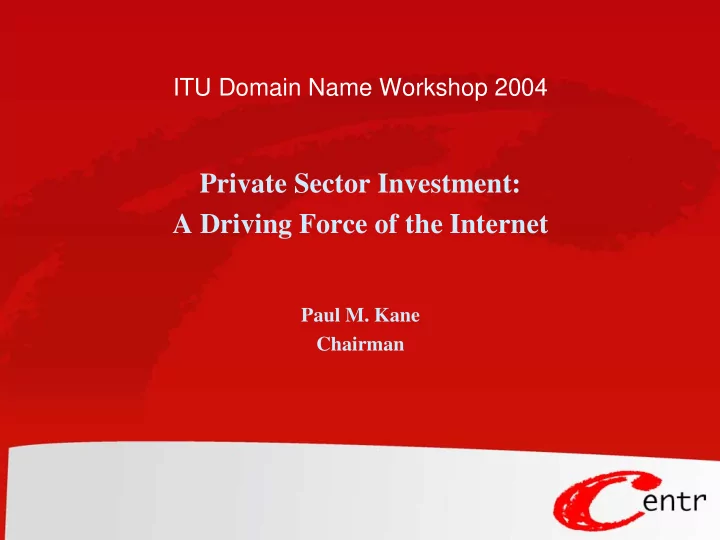

ITU Domain Name Workshop 2004 Private Sector Investment: A Driving Force of the Internet Paul M. Kane Chairman
If it works, Don’t fix it! • Internet is now a mature component of our lives (89.1% worldwide growth between 2000 and 2003) • E-Commerce is real: $6.8 trillions in 2004 • The DNS is acknowledged as a benchmark of excellence throughout the world. • Be careful what you ask for as it may happen – then it is YOUR problem! – possibly better to leave well alone until specific problems have been identified..
Freedom of Entrepreneurship • Deregulation is happening in every sector – Airlines, telecommunications… • Private companies demonstrate they can do better than the public sector – GSM covers 72% of cell phone users • Today’s Internet exists thanks to private investment – NSFNet was replaced by private backbones, web browsers commercialised by Microsoft and AOL…
Benefits of the Private Sector are visible all around the world • Chile has the highest penetration of Web-enabled phones in Latin America – Real alternative to fixed infrastructures thanks to competition between mobile carriers. – 41 % mobile penetration – Projected revenue of $1.3 bn. In 2007 • India’s high-tech sector is growing 30% a year – Exports should reach $12 bn in March of this year. – Thousands of jobs created by inward investment
Positive Effects of Deregulation: The Example of India Source: The World Bank
Positive Effects of Deregulation: The Example of India Source: The World Bank
ccTLDs and the Private Sector • Country Code Top Level Domains come from the private sector: – For the most part they were born as Universities or Research projects – Then transformed into private entities to cope with the growth of the 90’s. • Governments have not been willing to regulate – Regulations prevent the Community to benefit from the growth of the Internet and make the user use other services • Self-Regulation is a valid and working concept – CENTR
Impact of Strict Regulations on ccTLD usage April 2003 April 2001 Source: Market Trends Research™ - January 2003
Positive Effects of Deregulation: The Example of Sweden
Self Regulation: CENTR • Council of European National Top-Level Domain Registries • 40 members, far beyond European scope • Working together on Policy and Technical issues • “Best Practices” recognized by the whole community
Involvement of the Governments • Majority of European Governments are happy with the way ccTLDs are run because they have no complaints from users • Governmental Advisory Committee of ICANN is a way to involve governments in the DNS process. • European Commission supports self-regulation
For all Top Level Domain Registries National Law is always applicable Developing Consumer Protection No barriers to trade Best Practice Law enforcement Local Internet Community Government Regs Be competitive
Some of the aspects of running a Registry Registrars Protection against automated “data” gathering Consumers & E Commerce Easy to register Stable and Satisfy market Consumer demand Protection Technical Support Lawyers Every 8 months DNS (x509 certs) queries double
European Commission and Self Regulation • European Directives provide a necessary framework – 1995/46/EC on Data Privacy (WHOIS) – 2000/31/EC on e-Commerce • But wishes to let the private sector do its job – “Putting governments in charge of the Internet isn't the solution, we have to keep the Internet running and secure” (Erkii Likanen) • European Commission is an observer member to CENTR
Conclusion • Governance of the Internet is currently in the hands of those who have made the investment to set up and operate its infrastructure. • Unnecessary inter-governmental organisation would lead to the politicisation of the market place . • Until specific problems are identified – guesswork risks destabilising the efficient service culture. • Internet is dynamic and changing rapidly – attempts to capture the Internet will frustrate development – dialogue is essential to eradicate the digital divide.
Thank You The success (or failure) of the Internet in your country is in YOUR regulatory hands; Too late to regulate, Now time to liberate and stimulate. Paul.Kane@nic.ac
Recommend
More recommend